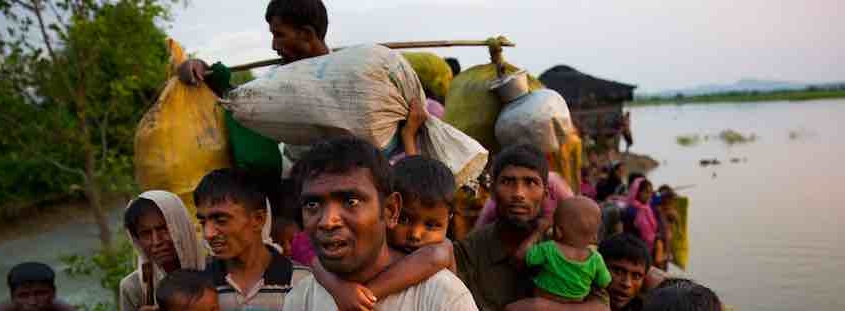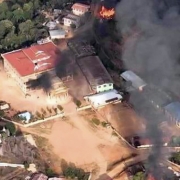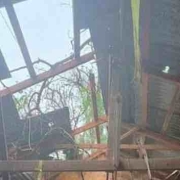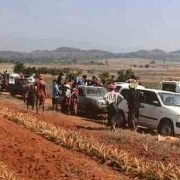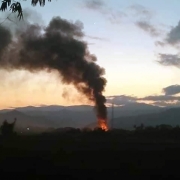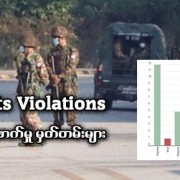International criminal court seeks arrest warrant for Myanmar junta chief
Prosecutor says 2017 Rohingya crackdowns were suspected of being committed by the army, police and civilians.
Updated at 1:47 p.m. on Nov. 27, 2024
The International Criminal Court, or ICC, issued an application for an arrest warrant on Wednesday for Myanmar’s army chief who now heads its junta, in connection with violence against the mostly Muslim Rohingya minority in western Myanmar’s Rakhine state in 2017, its prosecutor said.
Myanmar’s military conducted a sweeping crackdown on Rohingya communities in 2017 after Rohingya militants attacked police posts on the border with Bangladesh.
Thousands of people were killed when the military cleared and burned Rohingya communities. The violent campaign forced more than 740,000 people to flee to Bangladesh.
The United States and other countries said the attacks by Myanmar’s military against Rohingya civilians was genocide. U.N. investigators concluded that the military campaign had been executed with “genocidal intent”.
“After an extensive, independent and impartial investigation, my office has concluded that there are reasonable grounds to believe that Senior General and Acting President Min Aung Hlaing, Commander-in-Chief of the Myanmar Defence Services, bears criminal responsibility for the crimes against humanity of deportation and persecution of the Rohingya,” ICC prosecutor Karim Khan said in a statement.
“My Office alleges that these crimes were committed between 25 August 2017 and 31 December 2017 by the armed forces of Myanmar, the Tatmadaw, supported by the national police, the border guard police, as well as non-Rohingya civilians.”
Radio Free Asia was not immediately able to contact Myanmar’s military for comment.
In 2022, the International Court of Justice, or ICJ, rejected all of Myanmar’s objections to a case brought against it by Gambia that accuses it of genocide against the Rohingya minority.
Myanmar’s military regime had lodged four preliminary objections claiming the Hague-based court does not have jurisdiction and that the West African country of Gambia did not have the standing to bring the case over mass killing and forced expulsions of Rohingya in 2016 and 2017.
The ICC seeks to establish individual criminal responsibility for international crimes. The ICJ is concerned with state responsibility.
RFA attempted to contact the military council’s spokesperson, Maj. Gen. Zaw Min Tun, by telephone regarding the ICC prosecutor’s statement, but he did not respond.
Instead, the military council issued a statement on its Viber news network, asserting that “Myanmar is not a member state of the ICC and therefore does not recognize its statement.”
‘Could open the door for us’
Rohingya and rights groups welcomed the move.
“This is great news for us,” said Mohammed Jubair, acting chairman of the Arakan Rohingya Society for Peace and Human Rights, a Rohingya rights advocacy group based in the sprawling refugee camps in southeastern Bangladesh along the border with Myanmar’s Rakhine state.
“We want arrest warrants for everyone involved in the Rohingya genocide, not just the military leader,” he told BenarNews, an affilate to Radio Free Asia, on Wednesday.
“Bringing them to justice will also send a strong message to prevent such crimes in the future,” he said. “This could open the door for us to return to Myanmar.”
“The application for an arrest warrant for Min Aung Hlaing is long overdue and will be celebrated across Burma,” said Anna Roberts, Executive Director of Burma Campaign UK.
“For decades, the Burmese military has been allowed to get away with violating international law without facing consequences. Justice is slowly closing in on the generals, but there is still a long way to go,” she said.
“We can expect bluster and defiance from the Burmese military in response to the application for an arrest warrant, but in truth it will send shockwaves through the military, because their sense of impunity is finally being eroded.”
security forces.
Tun Khin, president of Burmese Rohingya Organisation UK, called it a day of celebration “not just for Rohingya, but for everyone from Burma.”
“This is not only about seeking justice and accountability, but also an acknowledgement of the crimes committed against us, which were ignored for so long. We must never forget that this was a preventable genocide, with ample warnings given, which the international community chose to let happen for the sake of a so-called reform process which was always a sham.”
Myanmar’s military and the then-government, led by democracy champion Aung San Suu Kyi, defended the 2017 crackdown in Rakhine state as a legitimate response to attacks by insurgents on Suu Kyi and her government were ousted in a February 2021 coup by Min Aung Hlaing.
She and hundreds of pro-democracy colleagues and supporters are in prison, while war between anti-junta forces and the military has spread across large parts of the country, including Rakhine state, where Rohingya have again been subjected to violent attacks.

